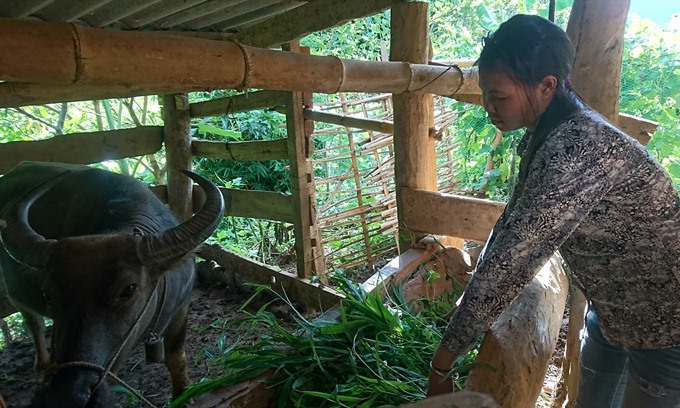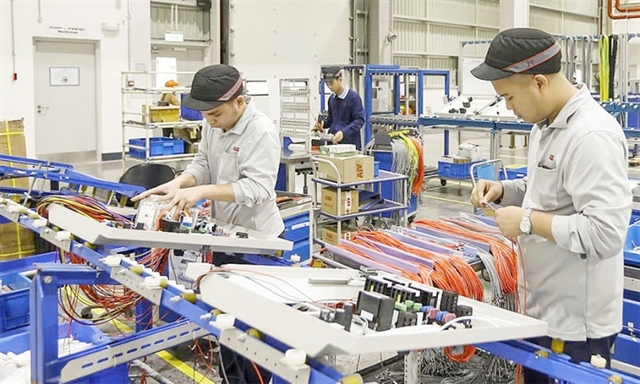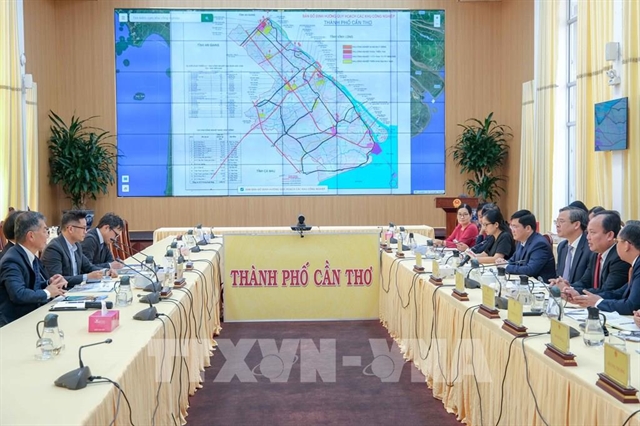 Society
Society

Many young people in the northern mountainous provinces of Lai Châu, Phú Thọ and Lào Cai have rushed illegally across the border to China, leaving their parents and children behind in the hopes of finding a well-paid job to improve their lives.
 |
| Quoàng Thị Vương in Thèn Sin Commune, Tam Đường District, the northern mountainous province of Lai Châu who had illegal immigrated to China seeking for a job returned to her hometown and earned the new livelihood. — VNA/VNS Photo Việt Hoàng |
LAI CHÂU — Many young people in the northern mountainous provinces of Lai Châu, Phú Thọ and Lào Cai have rushed illegally across the border to China, leaving their parents and children behind in the hopes of finding a well-paid job to improve their lives.
Most are living in poverty, and are lured across the border by brokers’ promises of jobs. Because of their illegal status, many are forced to work overtime and receive little to no payment in slave-like conditions. Some are even tortured by employers, police have said.
Figures from Lào Cai Province’s Police Department showed that more than 4,940 people have illegally crossed the border to China for work in the first three months of this year.
The situation is similar in Lai Châu Province, from which more than 2,000 people have moved illegally to China. As many as 46 people registered for family visit visas to China since the start of this year and have not returned.
Unlike Lai Châu and Lào Cai provinces, Phú Thọ does not share a border with China, but many residents nevertheless travel there in search of work. An average of nearly 500 people are reported to work illegally in China each year. Most were from remote areas of Hạ Hoà, Đoan Hùng, Tân Sơn, Thanh Sơn and Yên Lập districts.
Colonel Lò Văn Bích, deputy director of Lai Châu Province’s Police Department, told Vietnam News Agency that many people trusted brokers who promised to help them get jobs in China. They followed brokers, who were usually locals, to the border area of Lạng Sơn, Lào Cai or Quảng Ninh, and went to China via trails or rivers to avoid being caught by border guards.
Villages haunted by poverty
In Si Ma Cai District in Lào Cai Province, many rice fields are left uncultivated, covered with wild weeds, and in many houses there are only elderly people and children.
Giàng A Vảng, a 73-year-old H’Mông man in Cán Cấu Village said his son and daughter-in-law went to China for work, leaving four children at home for him to take care of.
“They did not want to leave, but we were so poor and the crop from the rice field was not enough to feed eight members,” he said.
Vảng said some villagers returned from China and said jobs were available and well-paid, so they decided to leave. They had no visas or working permits.
Vảng’s son is among 100 people who have illegally travelled to China since February.
Hảng A Tủa, chairman of Cán Cấu Commune’s People’s Committee, said that there are no jobs available for young people, while the soil contains limestone and is so nutrient-poor that it is difficult to cultivate crops on it.
In addition, Chinese employers do not require skilled labourers. Thus, many Vietnamese seize their chance to escape from poverty.
Nguyễn Hữu Hưởng, chairman of Sán Chải Commune’s People’s Committee, said in the first five months of this year, 480 people from the commune, aged between 30 and 40, sought illegal work in China. Some returned home every two weeks, and others once or twice a year.
More than 100 people left children at home alone, increasing the rate of drop-outs from schools, especially among secondary students, he said.
Reports from the commune’s secondary schools showed that 20 per cent of the total 355 students were usually absent from class.
Giàng Seo Phừ, a 13 year-old-boy, was playing the role of parent to five little kids. His parents, Giàng Seo Trá and Ly Thị Dở, went to China in February. The boy dropped out of school months ago. He spends his time picking wild vegetables, trapping mice and cooking meals for the kids.
There’s nothing valuable in the ragged and shattered house, which was covered by old awnings.
Phừ said he and his five siblings had not had a happy day with full meals since his parents left for work. The parents planted rice and corn in the small field once a year, but the yield was not enough to feed everyone.
He said he could return to school one day, when his parents got enough money.
43482139PM.jpg) |
| Lê Văn Sơn and his wife in Lương Sơn Commune, Yên Lập District, Phú Thọ Province have to take care of their grandchildren as their daughter-in-law was arrested for illegally immigrating to China for a job. — VNA/VNS Photo Việt Hoàng |
Painful regrets
Desperate to leave poverty, many have ignored all warnings of the dangers that might befall them in China. Some have been disabled or killed at their workplaces.
Chảo Láo Sử, 27, was one of the lucky people who survived the bus accident that killed more than 20 people on the way to China in March 2015. Soon after he graduated from the Irrigation University in 2014, Sử followed local people to China with the hope of finding a well-paid job.
The accident killed three villagers who were accompanying him to China. Sử returned home with only one hand left.
“I had a very expensive lesson. I should not bet my life for that,” he said.
Nguyễn Hoàng Thanh of Phú Thọ Province’s Lệnh Khanh Commune died in an accident after only three months of work in China.
Phạm Thị Hồng, mother of Thanh, said he was the breadwinner of the family. He chose to work illegally with hope of making more money.
Tòng Văn Giót, in Than Uyên District’s Mường Cang Commune, could not sleep well since he got the information that his son had gone missing while trying to illegally migrate to China for work.
Giót suffered from a stroke and found it hard to walk around. After several months, he has not received any information about his son, or his remains.
Support needed
Colonel Bích, deputy director of Lai Châu Province’s Police Department said the police have been dealing with agents and individuals who smuggled people across the border.
The police have encouraged those who worked in China illegally and returned home to tell their stories to local people as a way of educating them about the risks illegal migrants face.
Nùng Văn Nim, deputy director of the province’s Department of Labour, Invalids and Social Affairs said the department encouraged local people to work abroad legally, and increased information about the laws of labour export for people in border areas.
In Lào Cai Province’s Si Ma Cai District, the police would come to the houses of local residents who wished to get work visas.
The authorised agencies at localities have been asked to simplify legal immigration procedures. They would create policies for those who wanted to work in China in the upcoming time to ensure their rights.
The province will enhance negotiation and sign agreements on labour management between the province and China’s bordering provinces to create a legal corridor for Vietnamese labourers. So far, more than 300 labourers have been working for a Chinese electronic assembly company with the monthly salary of 1,700 yuan (US$258).
Đinh Văn Thơ, deputy director of the provincial Department of Labour, Invalids and Social Affairs said that the department planned to create 60,000 jobs for local people in the period of 2016-20. — VNS




